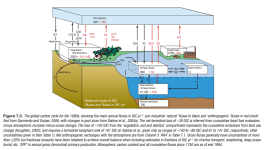What the hell has that got to do with Earth's climate?
1. CO2 absorbs infrared radiation. This has been for over a century. Greenhouse CO2 monitors use this to monitor CO2 levels.
2. Radiation from the sun is absorbed into the ground and ocean and then re-emitted as lower wavelength radiation.
3. Some of that lower wavelength radiation is absorbed by CO2 in the atmosphere. Same as the glass on a greenhouse.
And that's the greenhouse effect.

CO2 is not the only greenhouse gas; water and methane are also greenhouse gases.
Climate used to be called seasons [...]
You must be a laugh when you bring this material out at parties.
Seasons last three months; climate is measured over several decades.
[...] before the rabid leftards jumped on the bandwagon of this new cult!
The greenhouse effect has been established science since the 19th century. But I suppose Joseph Fourier was just virtue-signalling.

